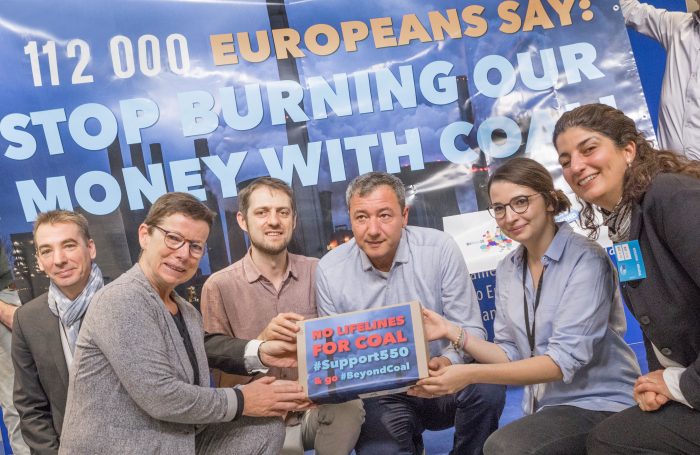15 October 2018
Stop Burning Our Money: EU Governments told to end €38bn toxic funding for coal
Some of Europe’s oldest, most polluting power stations are receiving millions of euro in government payments every year in what campaigners have described as ‘toxic funding’ for harmful fossil fuels.
Some national governments claim the payments are required to guarantee there is always enough electricity available in the grid, but campaigners say they have become a massive state-subsidy for Europe’s dirtiest fuels.
#CapacityMechanisms must end subsidising #coal. Taxpayer money should go towards the clean energy transition instead. It’s high time now that EU Governments show real #climateaction and #EndCoal subsidies! #support550 #CleanEnergyEU #BeyondCoal pic.twitter.com/Zrj8MCoO8d
— Joanna Flisowska (@j_flisowska) October 11, 2018
A Greenpeace analysis calculates the total cost of the subsidies to coal, gas and nuclear as being worth as much as €58 billion over the coming years. Greenpeace researchers were able to identify the type of fuel receiving the subsidy in around half of the cases, with 66% of that money going to coal-fired plants. Assuming that percentage is representative for all plants would mean more than €38 billion could pour into Europe’s most polluting fuel source in the coming years.
Changes to the EU rules on the bloc’s energy market are being discussed at three-way talks between the European Commission, MEPs and national governments next week.
Wendel Trio, Director of Climate Action Network (CAN) Europe, said that it was up to national governments to make a clear statement of intent at those talks:
“The recently published IPCC Special Report on Global Warming shows that keeping temperature rise to 1.5°C is still feasible, but requires an unprecedented shift in action. The EU needs to rapidly phase out coal and other fossil fuels, instead of subsidising them. All eyes are now on Member States to prove that they support the clean energy transition and rule out toxic funding from capacity mechanisms.”

MEPs Martina Werner (S&D, Germany), Florent Marcellesi (Greens, Spain) and Dario Tamburiano (EFDD, Italy) receive the petition in the European Parliament
A European Commission proposal, which is backed by the European Parliament, would exclude any power plant emitting more than 550 grams of CO2 per kWh of electricity generated from receiving capacity mechanism payments.
This rule would exclude coal-fired power stations from the subsidy, but would still allow gas and nuclear plants to receive the funds.
Many Member States support this Commission and Parliament’s position, but a number of national governments are lobbying hard to either cancel the 550 gram requirement or delay its implementation until as late as 2035 – 5 years after climate experts say the EU must have exited coal.
A Europe-wide campaign yesterday delivered a petition with more than 115,000 signatures to MEPs, calling on them to end so-called ‘capacity mechanism’ payments to coal power stations.
Mahi Sideridou, Managing Director of the Europe Beyond Coal campaign, said:
“While more and more European countries and companies are going coal-free, there are still governments resisting progress, despite knowing that this outdated fuel hurts people’s health and the environment.”
Explaining the motivation behind the petition, Sideridou said:
“Today, we bring the voices of Europeans to Brussels to tell EU decision-makers to stop wasting taxpayer money propping up coal. It’s time to focus on things that improve lives instead: renewable energy, energy efficiency and communities transitioning away from coal”
